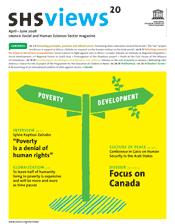| |
 |
 |
|
 |
 |
| SHSviews 20 |
| |
| UNESCO Social and Human Sciences Sector Magazine |
 |
| Globalization : To leave half of humanity living in poverty is expensive and will be more and more as time passes / Interview with Sylvie Kayitesi Zaïnabo: “Poverty is a denial of human rights” / Dossier: social and human sciences within National Commissions for UNESCO – Focus on Canada – April-June 2008 (English | Français | Русский) |
 |
 Poverty is not a fatality Poverty is not a fatality
“60 years after the adoption of the Universal Declaration of Human Rights, efforts have to be made to ensure that every human being is considered as part of humankind.”
“Man is the remedy for Man”. This African proverb underlines the moral demand for mutual support and solidarity to fight against the different forms of exclusion and injustice. The thousands of people who took to the streets last month in Africa, Asia or Latin America to express their anger against the ever-increasing costs of basic commodities, whilst at the same time reviving the phantom of world starvation, invite us to fulfill this duty. They are the living proof of the urgency to fight against poverty if we do not want to see the planet sinking into a string of revolts entailing every kind of danger.
Thus, it is important in this year of commemoration of the 60th anniversary of the Universal Declaration of Human Rights to refer to article 25 which stipulates that everyone has the right to a standard of living which provides minimum decent living conditions as well as health, food, and education.
Hence, we then understand that poverty, which causes as many deaths every week as those caused by the tsunami of December 2004, can be considered as a denial of the most fundamental human right, the right to life.
To fight against poverty therefore leads us to militate against all acts detrimental to human dignity. It is time, as José Saramago, Portuguese winner of the Nobel Prize for Literature says, to put in place a system of “global justice” capable of ensuring that there would be no human being dying of starvation or from any disease curable for some but not for others.
It is true that poverty is far from being a fatality as it can be seen in Europe, South Korea and China which bring to mind that corruption, level of education, health conditions, trade, market access and the migration process constitute factors of poverty or development and it is possible to put an end to it by making the economic system work for the most vulnerable populations.
It would be desirable to humanize globalization by using the levers that constitute investment, reform, national and international policies, in the same way that UNESCO tries to. This is how, for example, the Social and Human Sciences Sector, through its Management of Social Transformations (MOST) Programme provides Member States of the West African Economic and Monetary Union (WAEMU), with support to reread and negotiate Poverty Reduction Strategy Papers (PRSP) in the light of human rights.
Our main objective is indeed to “put science to work in the struggle against poverty and ensure that science resolutely serves peace”.
Sixty years after the adoption of the Universal Declaration of Human Rights, efforts have to be made to ensure that every human being is considered as part of humankind. The one defined by the enjoyment and exercise of inherent and inalienable rights.
Pierre Sané
Assistant Director-General
for Social and Human Sciences
This issue of SHSviews covers topical issues from April to June 2008:- Globalization : To leave half of humanity living in poverty is expensive and will be more and more as time passes
A seminar held in Kingston (Jamaica), in March 2008, has led outstanding Latin American researchers to review the multiple costs of poverty in the Caribbean, and more especially to present options available to the international community to cope with a phenomenon that affects nearly one in two people around the world. More … [PDF]
- Interview with Sylvie Kayitesi Zaïnabo: “Poverty is a denial of human rights”
Former Minister of Public Service and Labour of Rwanda, Sylvie Kayitesi Zainabo, Chairman of the Rwandan Commission for Human Rights was elected head of the Network of African National Institutes for Human Rights in 2007. In her interview she discusses human rights in Africa as well as the situation of refugees and displaced persons, victims of internal conflict which undermines the continent and puts the population at risk, preventing them from living in harmony and peace. Sylvie Kayitesi Zainabo invites everyone to fight against poverty, seen as a denial of human rights, in order to give the most needy access to food, a decent dwelling, education and health facilities. More … [PDF]
- Dossier: social and human sciences within National Commissions for UNESCO – Focus on Canada
SHSviews continues its round-the-world journey in a bid to explore the way social and human sciences are perceived within the National Commissions for UNESCO. After the Philippines, in this issue we move on to Canada, where the science-related activities of the Canadian Commission for UNESCO cover the social, human and natural sciences together, with a cross-sectoral approach being the order of the day. More … [PDF]
Also in SHS Views N° 20:
|
 |
 |
 Email this page Email this page  Printable version Printable version
|
 |
|
|


